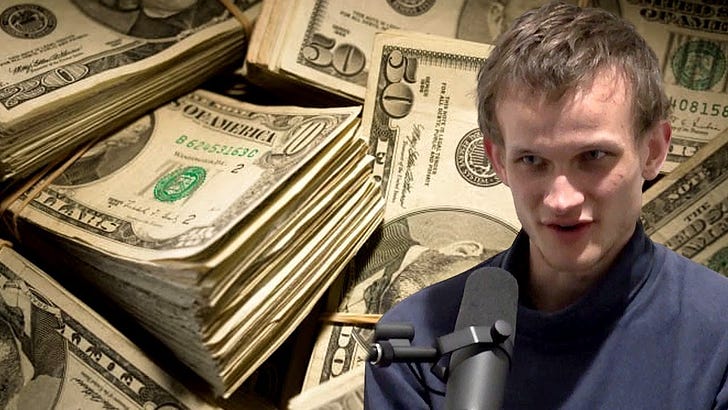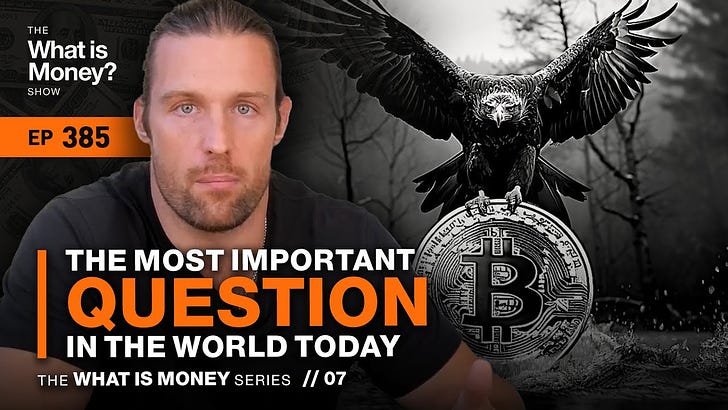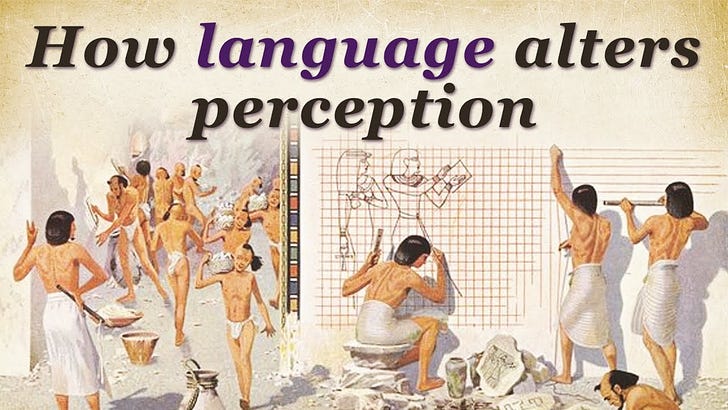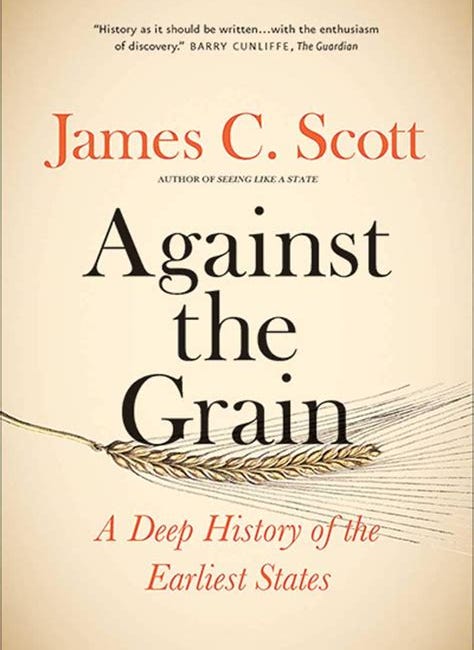Is Money a Game?
Why Vitalik Buterin's answer to the question "What is Money?" misses the mark.
Socialism never took root in America because the poor see themselves not as an exploited proletariat, but as temporarily embarrassed millionaires.
-John Steinbeck
“Fuck a piece of the pie, nigga, gimme the whole thing!”
Hey Folks,
Have you ever asked yourself “What is Money?”
Initially it might seem like a simple enough question, but it quickly becomes philosophical.
Why? Because money is a total system. We have a hard time seeing it for what it is because we live within a world of its making.
Lately, I’ve been exploring different answers to the question “What is Money?” and writing about it. It’s been illuminating.
Is Money the Root of all Evil? (READER APPRECIATION DAY)
Hey Nevermorons, One of my favourite readers goes by the name of ebear. I like him for multiple reasons. He combines extreme intelligence with skepticism, erudition and worldliness. He is clearly well-read, but his perspective is unmistakely From what I’ve pieced together, he’s lived all around the world, and absorbed many different cultural perspectives.…
IS TIME MONEY? (On Marx's labour theory of value)
Hey Folks! It’s Reader Appreciation Day! In this edition, I’ll be featuring Evelyn Brunswick, who has been my most prolific commenter of late. In preparation for the coming Bitcoin halving, which is about two weeks away, I’ve been educating myself about economics, which was never a major interest of mine until I got obsessed with the work of David Graeber…
WHY "WHAT IS MONEY?" IS THE WRONG QUESTION
Hey Folks, Not too long ago, Whitney Webb appeared on podcast called “What is Money?” I hadn’t heard of the show before, but the host did a great job of interviewing her. He also name-dropped James C. Scott, which is always a good sign. My interest was piqued.
IS MONEY A GAME?
Today I’m going to explore Vitak Buterin’s answer to the question “What is Money?”
If you don’t know who Vitalik Buterin is, he is the inventor of the Ethereum Network and supposedly one of the most smartest people in the world.
Now, I’ll admit, I kind of like Vitalik Buterin. He seems like a genuinely kind person, and he’s on record saying that part of his mission in life is to “destroy the banks”. He has also proposed a mathematical solution to “the tragedy of the common”, which seems well-intentioned. It seems to me that Vitalik is using his super-intelligence to try to make the world a better place. I can’t not like the guy.
When it comes to politics, however, he seems phenomenally naive.
Here is his answer to the question “What is Money?”:
“It’s a kind of game. It’s a game where we have points, and if you have points there’s this one move you can do where you can reduce your points by a number and increase someone else’s points by the same number.”
When interviewer Lex Friedman asks him if it is a fair game, Vitalik answers that it “one kind of fair game”.
He goes on explain why money is so great:
“It’s easy to set up, it serves a lot of useful functions, and so it just kind of survives for a meme for thousands of years.”
Is that it? Money is just a meme that endures because it’s useful? Useful to whom?
Note that nothing in his definition mentions power. We are left to assume that money was voluntarily adopted by the people of the world because it was convenient, which is completely ahistorical.
In reality, money was created so that people could pay tax. Money was invented to facilitate the extortion of farmers, who had previously paid tax in grain.
WHO MAKES A BETTER VILLAIN - THE FARMER OR THE TAX COLLECTOR?
Hey Folks, For much of the last year, I have been working on a book report. If that sounds like a dubious use of time, I should probably explain that the reason I’m spending so much time on a single book is because the book in question boldly promises “
Is there really such as a thing a “Good Guy Billionaire”?
It is worth noting that Vitalik is a billionaire. He may have the world’s best claim to being a “good guy billionaire”, but I doubt he’d see money as a game if he had ever lived in poverty.
Generally, participation is games is voluntary, whereas participation in the monetary system is not. When a cat plays with mouse before killing it, it may a game to a cat, but to the mouse it is a form of torture. And so it is with money.
Fundamentally, money is about coercive power, which ultimately derives from violence and the threat of violence. What money does is to disguise this violence and make a system of organized extortion seem natural and just. To pretend that money is a neutral “meme” that was voluntarily adopted by everyone in the world is to perpetuate a monstrous falsehood.
Money gives some people the power to order others to do their bidding, often simply because they were born into a rich family. The vast majority of the world’s population spend much of their time selling their lives piecemeal just so they can satisfy their need for these imaginary points.
Doesn’t seem like a very fun game, Vitalik. Sure doesn’t seem fair to me. But hey, maybe I’m just a sore loser.
That said, he goes on to say something very interesting, which confirms something that I’ve always suspected must be true.
“Money is definitely a kind of power, and there’s definitely people who want money because it gives them power. And then even if money doesn’t seem to be explicitly about money [sic], a lot of the things that people spend money on are ultimately about social status of some kind.”
He continues:
“If you have four billion dollars, the main benefit you get from going up to six billion dollars is that now instead of being below the guy who has five, you’re above the guy who has five.”
There you have it, folks. Right from a billionaire’s mouth. The reason that so much wealth is in so few hands is largely so that people who are already insanely rich can feel superior to other people who are already insanely rich. The way you win the game is to hoard as much wealth as you can.
At this level, billionaires don’t want more wealth so that they can use it in any way. They just want to get a dopamine fix by lording it over others.
Isn’t that infuriating?
CAPITALISM CREATES WEALTH AND POVERTY IN EQUAL MEASURE
Here’s the problem with this: wealth needs to come from somewhere. Capitalism does indeed allow some people to accumulate incredible wealth, but it creates poverty in equal measure.
This is difficult to see with money, which is invisible, but it is easy enough to see if we use concrete examples.
Imagine an apple tree in the middle of a town. This tree doesn’t belong to anyone, and it produces a limited number of apples. Let’s say it produces 300 apples per year, which happens to be the exact number of people in town. If each person took one apple, there would be enough to go around. But if one person (let’s call him Elon) takes 250 for themselves, that means the remaining 299 people are competing for 50 apples. Obviously, Elon is a prick. There’s no way that he can eat 250 apples before they spoil. Perhaps he has taken more than he needs simply because he is a compulsive hoarder, or perhaps he’s thinking two steps ahead. Because demand for apples now exceeds supply, he can now sell them them at a profit. He has created a market which previously did not exist by artificially creating scarcity, thereby enriching himself and impoverishing everyone else. In Marxist terms, this is called “primitive accumulation”.
What we call “the economy” is no different, but this reality is hidden behind layers and layers of mystification, which obscure the fact that there is a finite amount of real wealth in the real world.
If we assume that money derives its value from the existence of real things in the real world, of which there is a limited supply, this makes ample sense. One person having more of something means that everyone else has less. Extreme wealth and poverty are two sides of the same coin.
This is tricky to see when it comes to money, which can be created by banks with a wave of the proverbial wand, but it is easier to see when one considers land as a measure of wealth.
Let’s say that there are one hundred farms on an island. Every family on the island owns their own farm. Then comes a run of bad luck. First, tax collectors arrive and begin demanding ever-increasing sums to fund some foreign war. Then comes a seven-year famine, and many islanders are forced to sell their homes to the richest family in town. By the time the famine is over, 90% of the homes on the island are owned by a single family, who happens to be on friendly terms with the tax collectors. That family is now richer to the extent that the other villagers are now poorer.
It is most certainly true that capitalism creates extreme wealth. But it creates poverty in equal measure.
“TEMPORARILY EMBARRASSED MILLIONAIRES”
Nowadays, American billionaires are often treated like celebrities, if not Gods. People like Elon Musk and Vitalik Buterin have loyal fans, who see them as inspiring role models to learn from and emulate. People don’t seem to realize that the massive private wealth of certain individuals comes at their expense.
One is reminded of that quote about how in America, “the poor see themselves not as an exploited proletariat but as temporarily embarrassed millionaires.”
In a sense, Vitalik is right. For those on top, money is a game. It is contest to see who can hoard the most wealth. It is a game being played by the rich at the expense of the vast majority of the world’s population.
I think it’s high time that we all say “Fuck this!”, flip the table, and start playing a game that’s actually fun.
Might I suggest Hungry, Hungry Hippos?










CORRECTION: A previous version of this article uncritically repeated David Graeber’s claim that government debt is inversely correlated to private sector debt. I was presented evidence that contradicted this claim, so I edited the article.
If anyone wishes to see David Graeber's argument, you can find it here: https://www.theguardian.com/commentisfree/2015/oct/28/2008-crash-government-economic-growth-budgetary-surplus
In your example of the village with the apple tree and 300 people - if some jerk called Elon nicked 250 apples he wouldn't last long in the village. The people wouldn't stand for it (or, as per your monopoly board, they would stand - they wouldn't bend over and take it, let's say). He would be taught a lesson, and if he repeated his unsocial behaviour then he'd be ostracised...